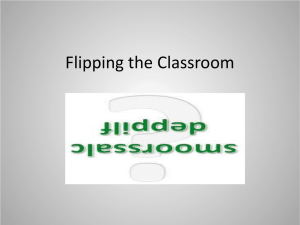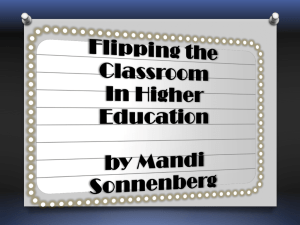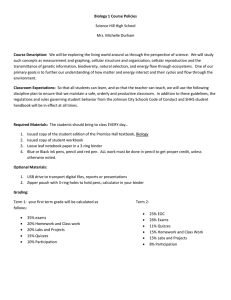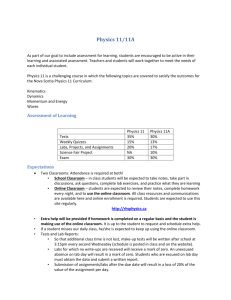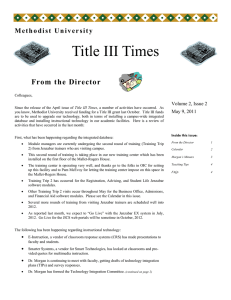Flipped Classroom Presentation
advertisement
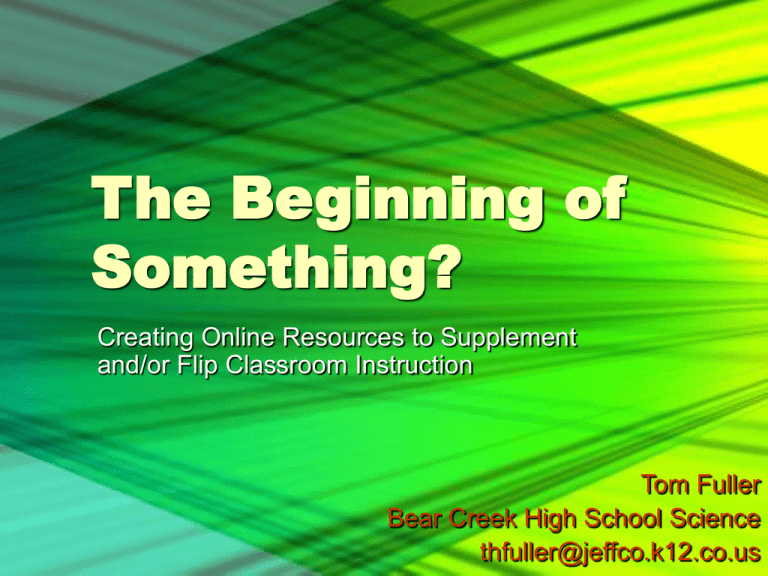
The Beginning of Something? Creating Online Resources to Supplement and/or Flip Classroom Instruction Tom Fuller Bear Creek High School Science thfuller@jeffco.k12.co.us What is a flipped classroom? Graphic used with permission from Knewton.com What’s driving flipped classrooms? Who’s leading? Jonathan Bergmann and Aaron Sams – Science teachers in Woodland Park, CO. How the flipped classroom is radically transforming learning Video Samples Who’s leading? Salman Khan – Former hedge fund analyst and founder of Khan Academy. Ted Talks – Let’s Use Video to Reinvent Education Khanacademy.org Who’s leading? Ramsey Musallam –Chemistry teacher and in San Francisco, CA. Edutopia - Should you flip your classroom? Adding accountability That’s all very interesting, but… I don’t really understand computers. That’s all very interesting, but… I don’t have that kind of time. That’s all very interesting, but… my students aren’t motivated enough. That’s all very interesting, but… too many students don’t have regular access to computers. At least that’s what I thought. But then I identified the one biggest barrier to the success of my students: ABSENCES. So I started with virtual labs. All labs are photographed or videotaped. Pictures and video are put in a powerpoint with clarifying information. Students are responsible for following along with the procedure, “collecting” data, and performing calculations and analysis. Two examples: Specific Heat of Lead Virtual Lab Speed of Sound Virtual Lab Then 8 weeks ago I moved to online lectures using Khan Academy as my model Two examples: Le Chatelier’s Principle Calorimetry Resources for making videos Necessary Hardware Computer writing tablet: Bamboo Tablet ($59 - $199, Best Buy) Necessary Software Drawing Program: Smoothdraw 3 (Download Free) Screen Capture: Camstudio (Download Free), Screencast-o-matic.com (Web Interface) Results so far Number of students turning in makeup labs has dramatically improved, often without the student having ever spoken to me. When surveyed, about 1/2 of my students had used at least one video to either review material or learn it for the first time due to an absence. Some students without computers at home have reported to me that they used the school library to access virtual labs. Results so far Students have reported: That they enjoyed not having to schedule a makeup time for labs and that they can do it on their own timetable. That sometimes they didn’t quite get material in class the first time around, but that they understood better when they could pause and rewind the lecture later on. That absences can often overwhelm them but having the lectures online helps reduce their stress when making up work for all their classes. Conclusion Don’t let barriers come between you and trying something new. You don’t have to do everything at once or be the best. Just provide help for your students where you can. The glass is never half empty. It’s just full of two different substances. What do you think? Pros and Cons of Flipped Classes Biggest problem in your classroom that you can use technology to tackle. Things you are already doing. The Beginning of Something? Creating Online Resources to Supplement and/or Flip Classroom Instruction Tom Fuller Bear Creek High School Science thfuller@jeffco.k12.co.us
